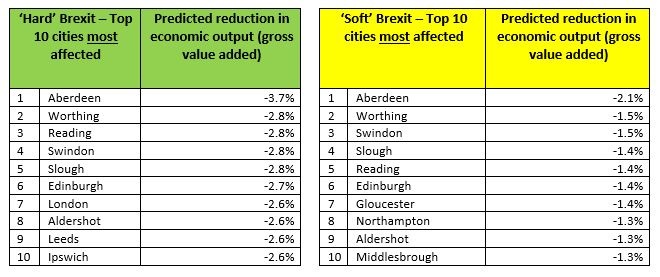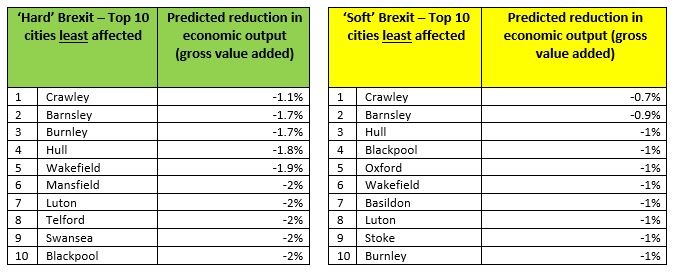27.07.17
All UK cities set for economic downturn regardless of ‘hard’ or ‘soft’ Brexit
All cities in the UK are looking set to see a fall in economic output regardless of whether a ‘hard’ or ‘soft’ Brexit is delivered, experts have today warned – but more prosperous regions will be hit harder than others.
In findings released by think tank Centre for Cities and the Centre for Economic Performance (CEP) at the London School of Economics, the potential impact of either Brexit ‘type’ on major cities in the UK was analysed for the first time.
This economic downturn is due to the predicted increase in trade costs that will come as a result of leaving the EU, although the findings also revealed that the impact on the economy will be twice as large in the event of a ‘hard’ Brexit.
On average, economic output in UK cities will see a 2.3% downturn in the event of a ‘hard’ Brexit, whereas a ‘soft’ Brexit will only see a 1.2% decrease.
Researchers also found that large southern cities with high-skilled service sectors will be hit hardest by either a ‘hard’ or ‘soft’ Brexit, although these cities are better placed to adapt to the economic shocks than less affluent places outside the south.
This is due to the fact that these cities specialise in large knowledge-intensive sectors such as business and finance, which will be heavily hit by increase in tariff and non-tariff barriers that Brexit will bring.
In the event of either a ‘hard’ and soft Brexit, Aberdeen and Worthing will be hit hardest, along with Swindon, Reading and Slough.

Smaller cities Crawley and Barnsley are predicted to have the lowest downturn in economic output of either a ‘hard’ or ‘soft’ Brexit, alongside cities like Hull and Wakefield.

Researchers also commented that it was intriguing that the cities least directly affected by either form of Brexit were less prosperous areas in the north, Midlands and Wales – places often described as the UK’s ‘left behind’ cities.
As these places have low numbers of high-skilled workers and smaller knowledge-intensive private sectors, they are both less vulnerable to the post-Brexit downturn but also less well-equipped to deal with the economic aftermath.
“All UK cities face significant economic challenges after we leave the EU, but the impact of both ‘hard’ or ‘soft’ Brexit will be felt very differently across the country,” said Andrew Carter, chief executive of Centre for Cities.
“Contrary to much of the received wisdom on Brexit, it is the most prosperous UK cities which will be hit hardest by the downturn ahead – but poorer places across the north and Midlands will find it tougher to adapt.”
Carter called on the government to do all it can to minimise the incoming economic shocks by securing the best possible trade deal with the EU, such as by ensuring post-Brexit trading arrangements are as close to the UK’s current relationship with Europe as possible.
“But it’s also critical that the government uses its forthcoming industrial strategy to give cities across the country the investment, powers and responsibilities they need to make their economies as successful and competitive as possible,” he continued.
“This will be crucial in helping cities to respond to the changing economic circumstances as we leave the EU, and to address the other big challenges they face in the coming years such as globalisation and automation.”
Professor Stephen Machin from the CEP added: “This research shows that focussing on the likely local economic impacts of Brexit will be a critical ingredient for policymakers when thinking about how to offset the negative economic effects that loss of trade due to Brexit will bring.
“A hard Brexit would amplify the negative impact of leaving the EU on local economies across the UK. The estimated decline in economic activity is higher in richer local economies like London. But Brexit – whether hard or soft – would still hurt economic activity in poorer areas like Hull and Burnley that have some of the lowest incomes in the country.”
Have you got a story to tell? Would you like to become a PSE columnist? If so, click here.